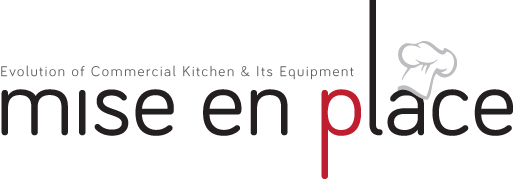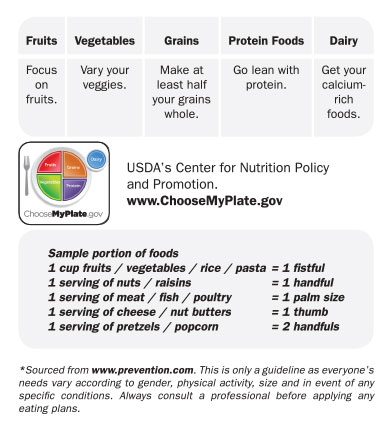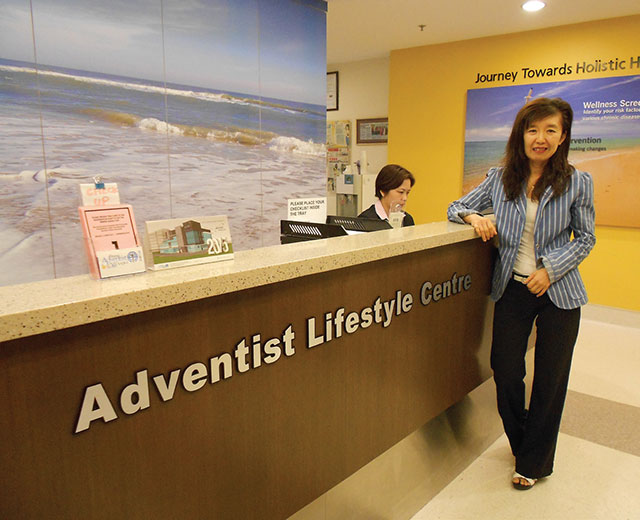
Looking to change your dietary habits? There is no shortage of ideas and recipes that you can glean from magazines and the amazing Internet. For whatever way you choose to go, as we talked about previously, many have also found it difficult to adapt to their lifestyle for the long run. The reason for “falling off the bandwagon” is simple. According to Asst Prof Dr Yen Ang, Lifestyle Intervention Consultant of Penang Adventist Hospital, many diet ideas are only shortterm and in medical terms; therapeutic. For example, you might go on a low-calorie diet or fasting for medical reasons but it is hard to sustain the diet for a long time and this method must be recommended by a certified nutritionist or dietitian and with a reasonable timeline to prevent the body from becoming nutrient deficient.
When people refer to low-fat, often the picture of only eating salads come to mind. There is still much to be done in educating the public about the good and bad fats; when you are aware of the difference, eating well can become a lifestyle, not a short-term effort to drop the kilograms. Would you be surprised to know that your body can take up to 30% of good fats daily and that it is necessary for absorbing certain nutrients, protect and provide structure for your cells, as a source of energy as well as to help nerves, brains and heart function? This was just one of the many misconceptions about nutrition highlighted by Dr Yen, which is what the Adventist Lifestyle Centre aims to do, not by “taking care only when illness happens” but assist in public knowledge regarding how their lifestyle can help prevent certain non-communicable diseases.

Vegetarian ideas of tortilla rolls and ‘satay’

As a nutritionist, she might advise on the general menu for the cafeteria but Dr Yen is not involved in the daily operations of food preparation. It is then over to Chef Peter Chan, the Foodservice Manager who works closely with dietitiens in ensuring patients receive the correct food options for their conditions. He says that, since Adventist Hospital is fully vegetarian; and the only one in the region following this approach, the menu is pretty much suitable for all patients. This can be an influence from its roots when the first Seventh-day Adventist health care facility opened in Michigan back in 1866 which promoted nutrition and exercise for preventive healthcare; it was called a sanitarium for the public (and patients) to learn to be well. Coming from a commercial setting, would managing a hospital’s menu require some form of certification? Chef Peter said that understanding what are heavy and light flavours, portion control and cooking with healthier methods would suffice.

Chef Peter in the Adventist
Hospital kitchen

sandwich loaves
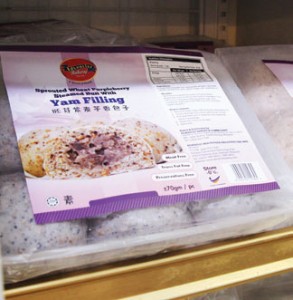
Buns
In line with the 100% vegetarian menu, Penangites also flock to Adventist Hospital for its breads that contain zero flour. Calling it Sprouted Life Grain Bread, Chef Peter says they have a container that sprouts the grains seeds or legumes and when sprouting occurs, plants are at its best to offer energy and nutrients. We curiously asked, without flour, how does bread bind? To which Chef Peter smiles and said “that’s our secret”. Sprouting has been found to increase levels of live enzymes, phytochemicals, minerals and vitamins between 10-200 times more than ordinary wholemeal bread. Ingredients include millets, corn, oats, rye, soy, lentil (all sprouted), honey, seeds and corn oil -bread can be healthy!
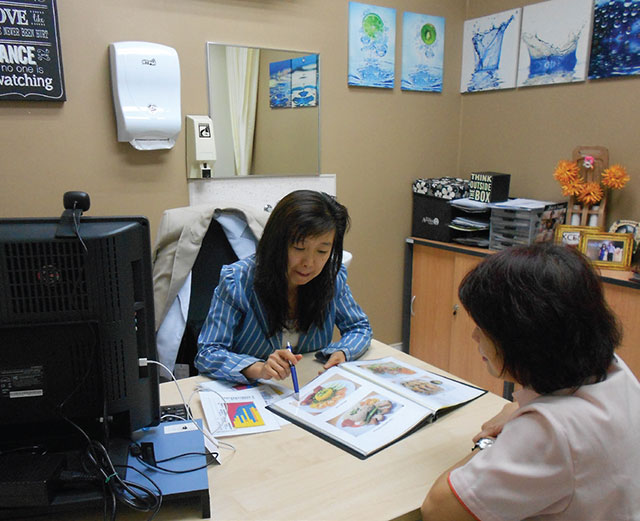
Dr Yen explaining menu ideas with a client
THE ADVENTIST APPROACH
Admittedly, there are not many healthy eating places in Malaysia. We might see the occasional salad bar, organic restaurant (as featured in the next segment) but perhaps there is a lack of knowledge in part of operators. Customers are savvier today; it is probably not enough to pass off a bowl of lettuce, carrot, cucumber and tomatoes as part of a healthy option. We asked Dr Yen how can food establishment carve its niche if it wants to try this approach?
In her opinion, healthy eating principle is applicable to everyone whether you are diabetic, suffer from heart disease or just plain healthy. The only difference is that the specific types of food consumed may be adapted to the culture and lifestyle of the people. Maybe you have heard of people cutting out rice, especially white rice, to lose weight but there is nothing wrong with rice. According to Dr Yen, “our forefathers ate rice, it was their energy source. They were healthy because they moved a lot”. Plus, if you told Asians not to eat rice, what will they eat? She also mentioned that our genetic predisposition varys continentto-continent. Citing a study where Asian immigrants in North America adapted to eating more meats, it was found that incidences of diabetes were actually higher in Asians than
the North Americans. Or how Asians are more likely to be sensitive to dairy and Westerners lacking tolerant for soy products. In essence, it would help if businesses look at its cultural climate of operations before introducing its menu. Would it be constructive to engage a nutritionist? In fact, Dr Yen told us that one can get a certification in foodservice diet in America and consult restaurants or the retail industry and she had worked in a foodservice facility prior to getting her license but she has yet to hear anyone practicing here but says that it is definitely something nutritionists can look into doing.
The Adventist Lifestyle Centre follows the MyPlate recommendations as illustrated; giving an idea of how much nutrients you ought to obtain from each meal. She opines that MyPlate is a more accurate description compared to the Food Pyramid because the latter does not inform the public on the type of nutrient to choose. If you were to visit MyPlate’s website, you will find a comprehensive list of food items in each food group. Therefore she would recommend clients to follow MyPlate because it projects a more complete picture and also gives an idea on portion control.
Established in 1924 by Dr. Earl Gardner, the Seventh-day Adventist Clinic Penang chapter was devoted in helping the poor and the sick. Today, it is a full fledged medical facility which also focuses on preventive and lifestyle intervention through easy-to-follow approaches in one’s diet and physical activity that will eventually become their selected lifestyle.
